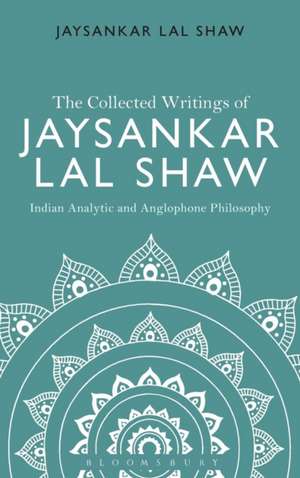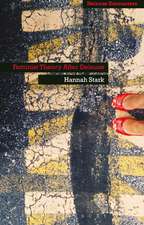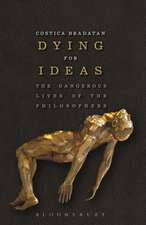The Collected Writings of Jaysankar Lal Shaw: Indian Analytic and Anglophone Philosophy
Autor Jaysankar Lal Shawen Limba Engleză Hardback – 21 sep 2016
Preț: 918.19 lei
Preț vechi: 1625.66 lei
-44% Nou
Puncte Express: 1377
Preț estimativ în valută:
175.72€ • 190.80$ • 147.60£
175.72€ • 190.80$ • 147.60£
Carte disponibilă
Livrare economică 01-15 aprilie
Preluare comenzi: 021 569.72.76
Specificații
ISBN-13: 9781474245050
ISBN-10: 1474245056
Pagini: 528
Dimensiuni: 156 x 234 x 29 mm
Greutate: 0.9 kg
Editura: Bloomsbury Publishing
Colecția Bloomsbury Academic
Locul publicării:London, United Kingdom
ISBN-10: 1474245056
Pagini: 528
Dimensiuni: 156 x 234 x 29 mm
Greutate: 0.9 kg
Editura: Bloomsbury Publishing
Colecția Bloomsbury Academic
Locul publicării:London, United Kingdom
Caracteristici
Draws on the philosophy of the Navya-Nyaya to address problems like false belief, higher order knowledge and extraordinary perception
Notă biografică
Jaysankar Lal Shaw is Associate Professor in the School of History, Philosophy, Political Science & International Relations at Victoria University of Wellington, New Zealand. He has taught at Jadavpur University, Calcutta, at the University of Alabama, USA, and the University of Hawaii, USA. Together with B.K. Matilal, he co-edited Analytical Philosophy in Comparative Perspective (1985).
Cuprins
PrefaceAcknowledgmentsIntroductionPART I: Metaphysics 1. Causality2. Buddhism on Suffering and Nirva?a3. The Referent of 'I': An Indian Perspective4. The Nature of Nyaya RealismPART II: Epistemology5. The Nyaya on Sources of Knowledge - Perception, Inference, Analogy, and Testimony: Some Contemporary Problems and their Solutions from the Nyaya Perspective6. Knowledge, Belief and Doubt: Some Contemporary Problems and their Solutions from the Nyaya Perspective7. A Note on Cognition of Cognition in Indian Philosophy8. Subject and Predicate9. Navya-Nyaya on Subject-Predicate and Related PairsPART III: Logic and Mathematics10. Austin on Falsity and Negation11. Empty Terms: The Nyaya and the Buddhists12. Negation and the Buddhist Theory of Meaning13. The Nyaya on Double Negation14. Universal Sentences; Russell, Wittgenstein, Prior, and the Nyaya 15. Singular Existential Sentences: Contemporary Philosophy and the Nyaya16. The Nyaya on Number17. The Concept of Relevance (Sa?gati) in Ga?gesaPART IV: Philosophy of Language18. Proper Names: Contemporary Philosophy and the Nyaya19. Demonstrative Pronouns 20. Descriptions: Some Contemporary Problems and their Solutions from the Nyaya Perspective21. Conditions for Understanding the Meaning of a Sentence: the Nyaya and the Advaita Vedanta22. Levels of Meaning23. 'Saturated' and 'Unsaturated': Frege and the Nyaya24. Some Reflections on KripkePART V: Morals and Values25. Dharma and the Law of Karma in Indian Culture26. The Nature of Human Beings: East and West27. Freedom: East and West28. Swami Vivekananda and Bertrand Russell on Conception and Development of Human Beings29. Concepts of Harmony in Indian PhilosophyBibliography Index
Recenzii
Shaw's work at the borders of Anglo-Analytic and Indian-Analytic philosophy is extremely engaging and it truly demonstrates how Indian philosophy can be a part of the contemporary world philosophy and comparative philosophy milieu . [this book] provides a bridge between contemporary research in analytic philosophy and classical Indian philosophy across a number of core areas. One can be assured that studying his work will lead to gaining insights and making connections between traditions of philosophy. Thus, this is an important publication for philosophers of whatever orientation.
There has never been anyone who has done more to focus Western philosophers on the significance of Indian analytical philosophy, in particular, philosophical logic and the philosophy of language, than Professor Jay Shaw. I'm delighted that finally there is a single volume that brings all of these exciting and creative papers together.
Jay Shaw is greatly accomplished at demonstrating deep knowledge of not only one, but multiple philosophical traditions, using one to illuminate issues raised in another. By juxtaposing linguistic aspects of Nyaya with the philosophy of language in analytic philosophy, for example, he provides new comparative insights which are likely to come as a surprise to many analytic philosophers.
Dr. Jaysankar Lal Shaw is one of the most significant stalwarts of Indian and comparative philosophy in the contemporary analytical context. Grappling with the interstices of Indian and contemporary (Western) analytical thinking in an inimitable way, each of Shaw's essays shows the 'gift of fruitful dialogue' and 'conversation' between (seemingly) disparate traditions of thought, demonstrating his enormous influence across various sub-fields of philosophy.
There has never been anyone who has done more to focus Western philosophers on the significance of Indian analytical philosophy, in particular, philosophical logic and the philosophy of language, than Professor Jay Shaw. I'm delighted that finally there is a single volume that brings all of these exciting and creative papers together.
Jay Shaw is greatly accomplished at demonstrating deep knowledge of not only one, but multiple philosophical traditions, using one to illuminate issues raised in another. By juxtaposing linguistic aspects of Nyaya with the philosophy of language in analytic philosophy, for example, he provides new comparative insights which are likely to come as a surprise to many analytic philosophers.
Dr. Jaysankar Lal Shaw is one of the most significant stalwarts of Indian and comparative philosophy in the contemporary analytical context. Grappling with the interstices of Indian and contemporary (Western) analytical thinking in an inimitable way, each of Shaw's essays shows the 'gift of fruitful dialogue' and 'conversation' between (seemingly) disparate traditions of thought, demonstrating his enormous influence across various sub-fields of philosophy.
















